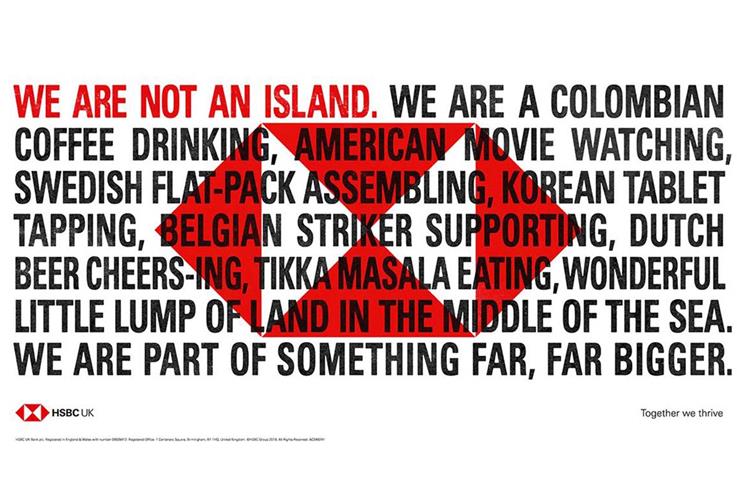With and still no real sense of what is going to happen after the big moment, it’s not surprising that this divided nation is making war over minor things. Perhaps that’s why HSBC’s new poster campaign has caused such uproar, when it carries almost exactly the same messaging as the TV spot the bank launched in January last year starring Richard Ayoade.
The new work, which outlines various ways in which international culture enriches our lives in the UK, has been received by people on both sides of the divide as anti-Brexit (and, for those of a certain persuasion, anti-democracy).
— Tim Montgomerie (@montie)We are an island actually - full of villages and towns your bank deserted; of cleaners you underpaid; and of money laundering and other laws you bent. etc was a response to the economy you helped decimate. Thanks for the lecture but we’ll manage without it.
The HSBC ad is clearly anti-Brexit. If it wanted to make the point it professes to make, it should have read: ‘We are not just an island’. But to state ‘We are not an island’ is clearly stupid. Change accounts if you have any.
— Alan Sked (@profsked)
Nauseating pro anti rubbish from regarding
— Babis Gakis ???????????? (@BabisGakis)
— Naybomb (@naybomb85)You’re god damn right the add is anti-Brexit! Why should they be neutral in this shit show? Not only is it in their interest, what they say is metaphorically and literally true! I applaud them.
HSBC, however, says it’s not about Brexit. Well – sort of. The bank’s spokesman has briefed the media that the campaign is not about Brexit – but it refuses to go on the record and actually say so explicitly. Instead, it has offered up the rather bland statement that the campaign is about "reinforcing our strong belief that the things that make us quintessentially British are the things that make us inescapably international".
Of course, the points the campaign makes applied before 2016 and will probably continue to apply in certain ways long after the looming climate apocalypse. It’s also completely on-brand for the bank; this is hardly a case of shit-stirring for its own sake.
But the reality is that, at present, the campaign is speaking to people on one side (and one side only) of a specific political divide on what happens to be the most significant and painful issue in the politics of this country right now.
Yes, there are plenty of Brexit supporters who consider themselves internationalists, and for a long time its most optimistic cheerleaders sold the move as a chance to open our country to the world. But the driving force of the project has always been an anti-immigration sentiment – and we are now looking at an exit deal in which the end of free movement is the only real "upside".
So yes, putting this message out at this moment in time is definitely an attempt by the bank to align itself with the remoaners, the remainiacs, the traitors to democracy – to say to them: "We are your people." And yet the mushy response to reasonable questions about whether the campaign is meant to be about Brexit tells us the brand lacks the courage of its convictions.
It was probably unlikely that HSBC would come out to say that yes, this was a statement in favour of remaining in the European Union; the damage among a large chunk of its customer base could have been real and significant. But declining to offer a real rebuttal is a weak move that allows HSBC to keep open that coded signal to remainers without completely alienating leavers. Boris Johnson must be greatly impressed by this nimble performance of having your cake and eating it.
When politicians use coded language to let certain parts of the population – often racists – know that they can be trusted, it is called dog-whistling. I'm not in any sense putting HSBC on the same (or any other kind of boat) as racist politicians. But its tactics do bear a striking resemblance.
There was an another approach the bank could have taken. Admit that this campaign was a comment on the perilous situation the UK is in right now. Be open about the concerns the business has with Theresa May’s deal and, most of all, the no-deal exit increasingly supported by Brexiters. Use your expertise in communications to make a case in a way that will resonate with as much of the population as possible. Instead of creating special executions only for London, Leeds and Manchester, make them for Stoke-on-Trent, Thurrock and Boston. Don’t assume the people in these places are not worth your time because of their demographic and voting patterns. Speak to them in the same language as everyone else – you might be surprised by how many are receptive to what you have to say.



